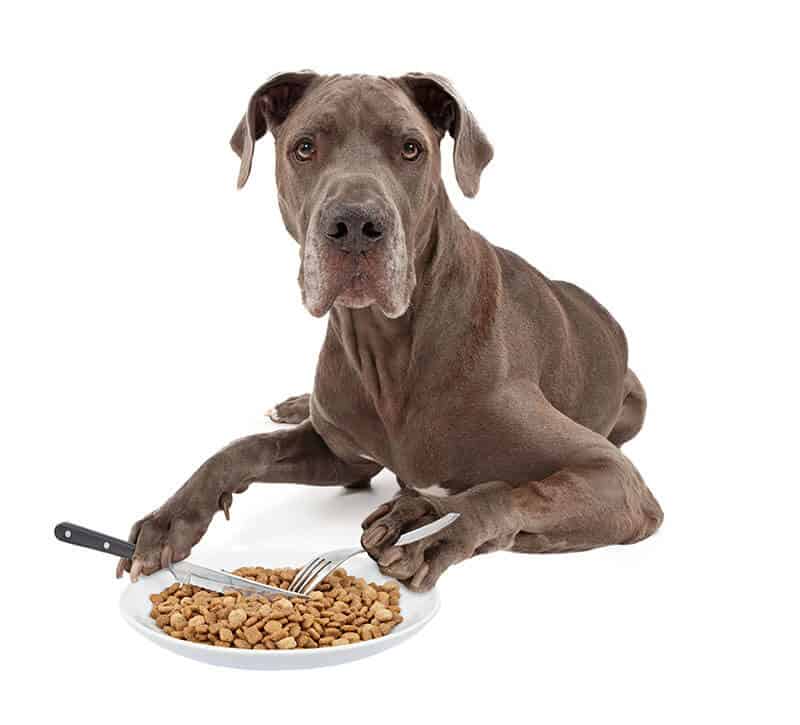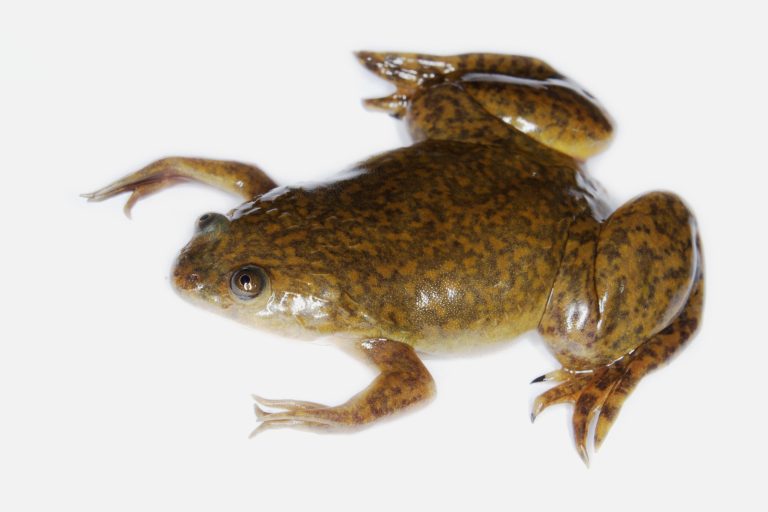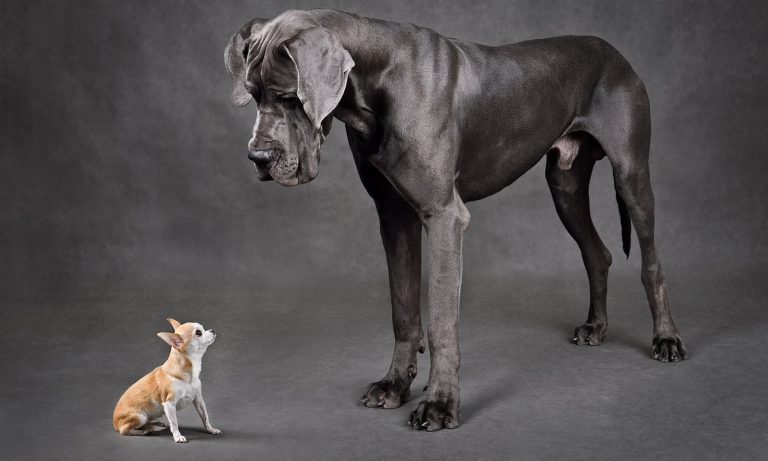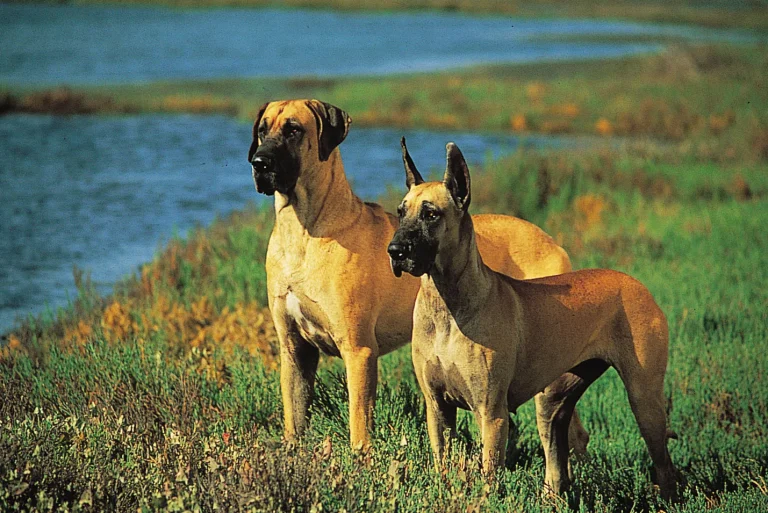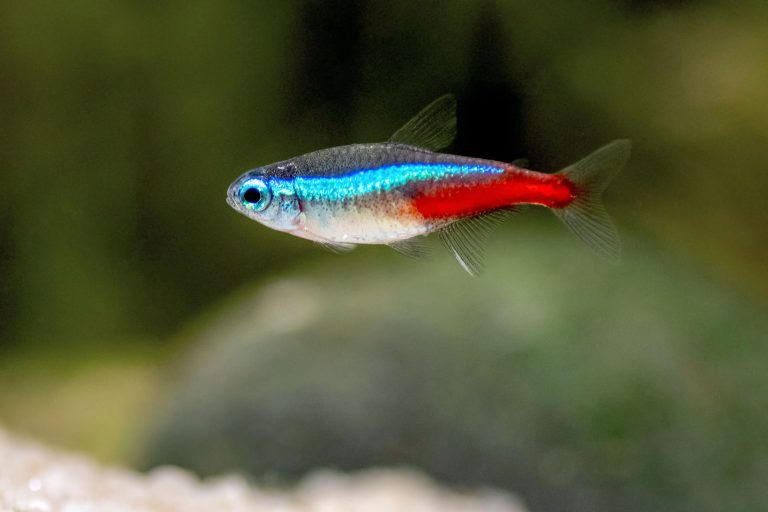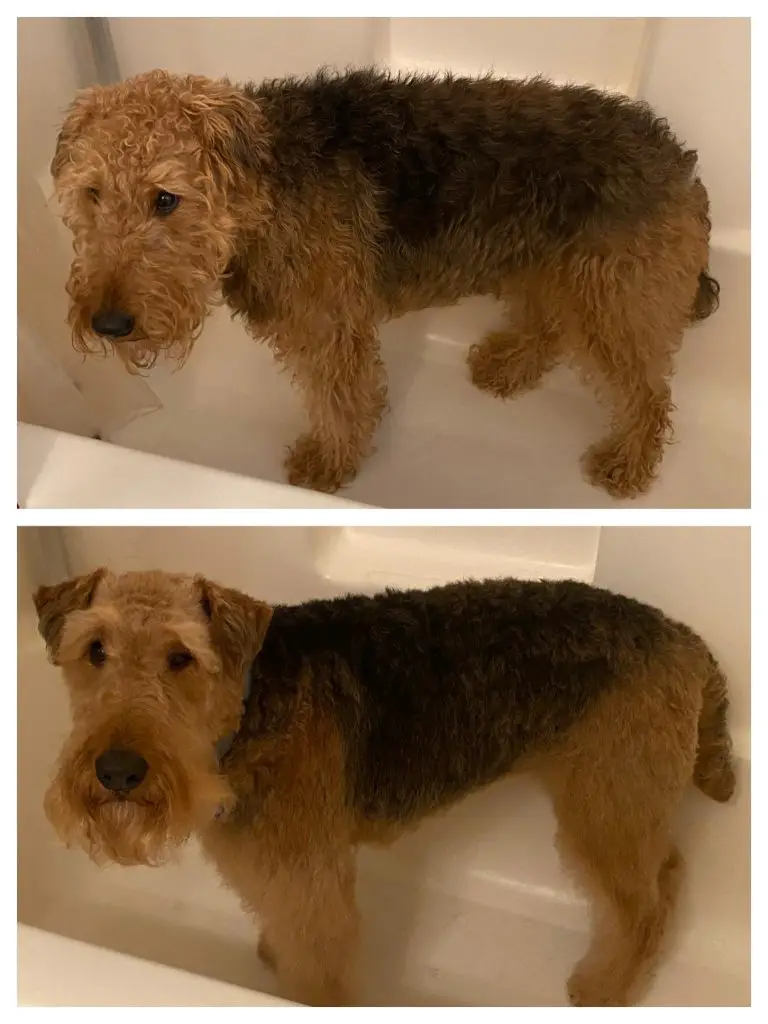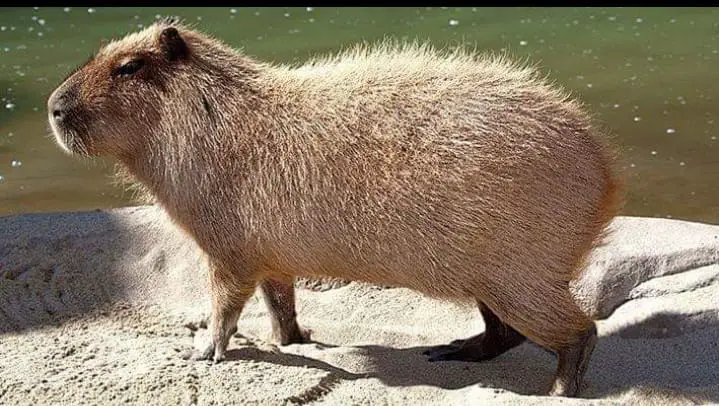How Much Food Do Great Danes Eat Daily & Weekly?
Great Danes typically eat about 4-6 cups of food per day, which amounts to 28-42 cups of food on a weekly basis. Great Danes, being a giant breed, have a significant appetite and require a substantial amount of food daily.
This breed needs a diet that caters to their size, energy levels, and overall health. Determining the appropriate amount of food to feed a Great Dane is crucial to ensure they receive adequate nutrition without overfeeding, which can lead to weight issues and other health problems.
We will delve into the dietary needs of Great Danes and provide you with a clear understanding of how much food they should consume on a daily and weekly basis. So, if you are a proud owner of a Great Dane or considering adopting one, stay tuned to learn more about their dietary requirements.
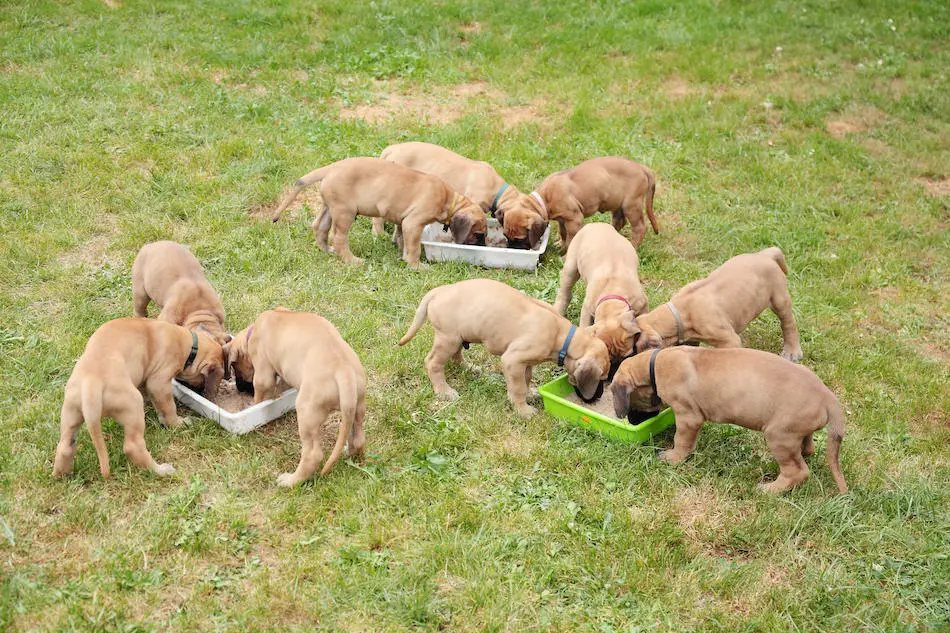
Understanding Great Danes’ Nutritional Needs
Understanding Great Danes’ nutritional needs is crucial for their overall health. These gentle giants require a substantial amount of food, consuming around 4-5 cups of high-quality dog food daily, totaling approximately 28-35 cups per week.
Great Danes are impressive dogs known for their immense size and gentle nature. To keep these giants healthy and happy, it’s crucial to understand their nutritional needs. Here, we will explore the factors that influence a Great Dane’s food intake, the recommended daily caloric intake for adult Great Danes, and the essential nutrients they require for optimal health.
Factors Influencing Great Danes’ Food Intake
The amount of food a Great Dane consumes can vary based on several factors. Here are the key factors that influence their food intake:
- Age: Great Dane puppies require more food and frequent feedings to support their rapid growth and development.
- Activity level: More active Great Danes will have higher caloric requirements compared to their less active counterparts.
- Metabolism: Each Great Dane has a unique metabolism, and some may require more or less food based on their individual needs.
- Neuter status: Neutered or spayed Great Danes may have lower energy requirements compared to intact dogs.
Recommended Daily Caloric Intake For Adult Great Danes
Understanding the recommended daily caloric intake for adult Great Danes is essential to ensure they receive the necessary energy for their size and activity level. On average, adult Great Danes require around 2,500 to 3,500 calories per day. However, it’s vital to consult with your veterinarian to determine the exact caloric needs of your individual dog.
Important Nutrients For Great Danes’ Health
Great Danes have specific nutritional needs to support their overall health and well-being. Here are some essential nutrients they require:
- Protein: Great Danes need a high-quality protein source to support their muscle development and repair.
- Calcium and Phosphorus: These minerals are crucial for maintaining strong bones and supporting proper growth in Great Danes.
- Omega-3 Fatty Acids: Found in fish oil or flaxseed, omega-3 fatty acids promote a healthy coat, reduce inflammation, and support brain function.
- Glucosamine and Chondroitin: These supplements help support joint health and mobility, which can be important for Great Danes prone to joint issues.
- Vitamin E: An important antioxidant, vitamin E helps protect cells from oxidative damage and supports a healthy immune system.
Remember, these are general guidelines, and it’s always essential to consult with your veterinarian to develop a specific and balanced diet plan tailored to your Great Dane’s unique needs.
Providing your Great Dane with a well-balanced diet that meets their nutritional requirements is crucial for their overall health and longevity. By understanding the factors that influence their food intake, the recommended caloric intake, and the essential nutrients they need, you can ensure your Great Dane thrives and remains a happy and healthy member of your family.
Feeding Guidelines For Great Danes
Great Danes have specific feeding guidelines to ensure their health. On a daily basis, a Great Dane typically requires 4-6 cups of high-quality dog food, divided into two meals. Weekly, this translates to approximately 28-42 cups of food. Adjustments may be needed based on the individual dog’s age, activity level, and health condition.
Great Danes are known for their large size and muscular build, which means they require a substantial amount of food to meet their energy needs. Feeding them the right amount of food is essential to help maintain their overall health and well-being.
In this section, we will discuss the different types of dog food suitable for Great Danes, how to determine the right portion size for your Great Dane, the best feeding schedule, and considerations for feeding puppies versus adult Great Danes.
Types Of Dog Food Suitable For Great Danes
- High-quality dry dog food: Look for brands that offer a specifically formulated formula for large breed dogs, as they contain the right balance of nutrients needed for your Great Dane’s growth and development.
- Wet dog food: Although not as commonly used as dry dog food, wet food can be included in your Great Dane’s diet to add moisture and variety.
- Raw or homemade diet: Some Great Dane owners choose to feed their dogs a raw or homemade diet, consisting of fresh, unprocessed ingredients. However, it’s essential to consult with a veterinarian or canine nutritionist to ensure the diet is nutritionally balanced.
How To Determine The Right Portion Size For Your Great Dane
- Ideal weight: Consider your Great Dane’s ideal weight and consult with your veterinarian to determine the appropriate daily calorie intake.
- Feeding guidelines: Most dog food brands provide feeding guidelines on their packaging, which serve as a starting point for portion sizes based on your Great Dane’s weight.
- Monitor body condition: Regularly assess your Great Dane’s body condition by feeling their ribs and observing their overall physique. Adjust the portion size as needed to maintain a healthy weight.
Best Feeding Schedule For Great Danes
- Consistency: Establish a consistent feeding schedule for your Great Dane, with two meals per day being the standard. This helps prevent overeating and promotes digestion.
- Avoid excessive exercise before and after meals: Great Danes are prone to bloat (gastric dilatation-volvulus), a serious condition that requires immediate veterinary attention. To minimize the risk of bloat, avoid vigorous exercise before and after meals.
Considerations For Feeding Puppies Vs. Adult Great Danes
- More frequent meals: Puppies have smaller stomachs and faster metabolisms, so they require more frequent meals compared to adult Great Danes. Provide three to four meals a day until they are around six months old, then transition to two meals.
- Controlled growth: It’s important to ensure that puppies grow at a controlled rate to prevent developmental issues. Follow the recommended feeding guidelines for puppies and monitor their weight and body condition closely.
Remember, every Great Dane is unique, so it is essential to consult with a veterinarian to determine the most appropriate feeding plan for your furry friend. By providing the right food, portion sizes, and feeding schedule, you’ll help your Great Dane maintain optimal health and thrive.
Tips For Feeding Great Danes
Great Danes require a substantial amount of food daily and weekly to meet their nutritional needs. It’s recommended to feed them around 3-6 cups of high-quality dog food per day, divided into two meals. Adjustments may be needed based on their age, metabolism, and activity level.
Great Danes are majestic dogs known for their gentle nature and imposing size. As a giant breed, they have specific dietary needs to support their growth and overall health. To ensure that your Great Dane is well-nourished and thriving, here are some essential tips for feeding them:
Slow Feeding Techniques To Prevent Bloat:
- Use a slow feeder bowl: Opt for a specialized slow feeder bowl with ridges or obstacles that make it more challenging for your Great Dane to gulp down their food. This helps prevent bloating and encourages slower eating.
- Divide meals into smaller portions: Instead of feeding your Great Dane one large meal, split their daily intake into several smaller meals throughout the day. This can aid in digestion and reduce the risk of bloat.
- Use puzzle toys: Incorporate puzzle toys into mealtime to provide mental stimulation and slow down eating. By making your Great Dane work for their food, you can prevent them from gorging and potentially developing bloat.
Avoiding Common Feeding Mistakes:
- Free-feeding: Avoid leaving food out all day for your Great Dane to graze on. This can lead to overeating and weight gain. Stick to a feeding schedule and remove any uneaten food after a designated time.
- Feeding too quickly after exercise: It’s best to wait at least one hour after exercise before feeding your Great Dane. Rapid eating immediately after physical activity may increase the chances of bloat.
- Limit treats and table scraps: While it may be tempting to give your Great Dane extra treats or share human food, excessive indulgence can lead to weight gain and nutritional imbalances. Stick to healthy, dog-specific treats and avoid table scraps altogether.
Dietary Supplements For Great Danes:
- Joint support: Great Danes are prone to joint issues, so consider adding glucosamine or chondroitin supplements to their diet. These supplements can help maintain healthy joints and support mobility.
- Omega-3 fatty acids: Including fish oil or flaxseed oil in your Great Dane’s diet can promote a healthy coat, reduce inflammation, and support heart health.
- Probiotics: Adding probiotic supplements to your Great Dane’s diet can aid in digestion and promote a healthy gut microbiome. This can be especially beneficial if your dog experiences any digestive issues.
Transitioning To A New Diet:
- Gradual transition: When switching your Great Dane to a new diet, it’s essential to do it gradually. Start by mixing a small amount of the new food with their current food and gradually increase the ratio over a week or two. This helps avoid digestive upset.
- Monitor their response: Keep a close eye on your Great Dane’s behavior, stool consistency, and overall well-being during the transition. If you notice any signs of discomfort or digestive issues, consult with your veterinarian.
Remember, each Great Dane may have unique dietary requirements, so it’s always a good idea to consult with a veterinarian to ensure you’re providing the best possible nutrition for your gentle giant. By following these tips, you can help your Great Dane maintain a healthy and balanced diet, setting them up for a happy and thriving life.
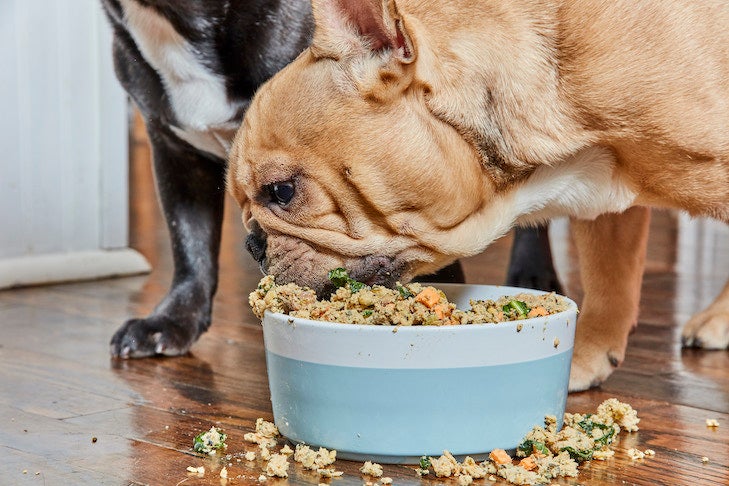
Frequently Asked Questions On How Much Food Do Great Danes Eat Daily & Weekly?
How Much Food Does A Great Dane Eat A Week?
A Great Dane typically eats around 10-12 pounds of food per week.
How Often Should You Feed A Great Dane?
A Great Dane should be fed two to three times a day for optimal health.
What Are Great Danes Favorite Food?
Great Danes typically enjoy a balanced diet consisting of high-quality dog food and occasional treats.
What Should A Great Danes Diet Consist Of?
A Great Danes diet should consist of high-quality protein, balanced nutrients, and appropriate portion sizes.
Conclusion
Great Danes are magnificent, gentle giants that require proper nutrition to maintain their health and well-being. Feeding these large breeds can be a challenge, but understanding their dietary needs is essential. By providing the right amount of high-quality food, you can ensure your Great Dane remains happy and energetic.
The daily and weekly food requirements can vary based on their age, weight, activity level, and overall health. It is crucial to consult with your veterinarian to determine the appropriate feeding plan for your Great Dane. Remember, overfeeding can lead to obesity and various health issues, while underfeeding can result in malnutrition and stunted growth.
Monitoring your dog’s body condition and adjusting their food intake accordingly is vital. Always choose a balanced diet with proper proportions of protein, carbohydrates, and fats to support their growth and meet their nutritional needs. With the right diet, your Great Dane will thrive and enjoy a long, healthy life by your side.

